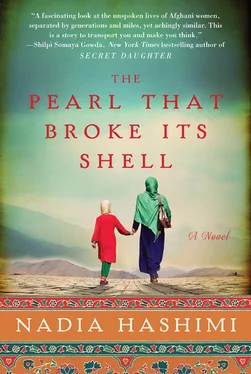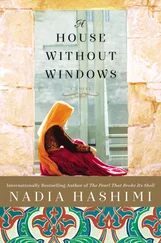After a moment, we heard Khala Shaima interrupt.
“ Yaa Musabbibal Asbaabi. ”
There was a pause. The room had gone silent.
“ Khanum, did you have reason to interrupt Haji- sahib ?”
“Yes, I did. Mullah- sahib is reading the sura incorrectly. Oh causer of the causes, the verse is meant to read. Not causer of the fingers . I’m sure he would want to know he was making such an egregious error, wouldn’t you, Haji -sahib ?”
The mullah cleared his throat and tried to pick up where he had left off. He thought hard but recited the verse the exact same way, error and all.
“ Yaa Musabbibal Asaabi. ”
Khala Shaima corrected him again.
“ Asbaabi, Mullah- sahib .” Her tone was that of an annoyed schoolteacher. It didn’t go unnoticed.
I feared Padar- jan would make good on his threat to cut out Khala Shaima’s tongue. I was nervous for her.
“Shaima- jan, please have a little respect for our esteemed mullah here,” Boba- jan said.
“I have the utmost respect for him,” she said facetiously. “And I have the utmost respect for our Qur’an, as I’m sure you all do. What a disservice it would be for us to recite the verse incorrectly.”
Once more, the mullah sighed and cleared his throat.
“ Yaa Musabbibal Asbaabi Yaa Mufattihal Abwaabi. ”
“That’s better,” Khala Shaima interrupted loudly. I could hear the satisfaction in her voice.
We could hear the men beginning the nikkah in the next room. Padar- jan was giving his full name, his father’s name and his grandfather’s name to be written on the marriage contract.
Parwin tried to put on a strong front, seeing Madar- jan ’s condition. Khala Shaima, our only advocate in the nikkah, had strategically positioned herself between my grandfather and Abdul Khaliq’s mother. No one knew what to make of her presence. Padar- jan huffed in frustration but thought it best not to make a scene in front of his guests.
Madar- jan spoke softly. We had formed a tight circle in the next room.
“My daughters, I prayed this day would not come so soon for you but it is here and I’m afraid there’s nothing I or Khala Shaima can do to stop this. I suppose this is God’s will for you. Now, I haven’t had much time to prepare you, but you are young women,” she said, hardly believing her own words. “Your husbands will expect things of you. As a wife, you have an obligation to your husband. It won’t be easy at first but… but with time you’ll learn how to… how to tolerate these things that Allah has created for us.”
When Madar- jan began to cry, we cried as well. I didn’t want to know what it was Madar- jan was talking about. It sounded like it was something terrible.
“Please don’t cry, my girls. These things are a part of life — girls are married and then become part of another family. This is the way of the world. Just as I came to your father’s home.”
“Can I come back sometimes, Madar- jan ?” Parwin asked.
Madar- jan exhaled slowly, her throat thick and tight.
“Your husband will want you at home but I hope that he is a man of heart and will bring you here from time to time to see your mother and your sisters.”
This was as much as she could promise. Parwin and I sat on either side of our mother, her hands stroking our hair. I had my hands on her knee. Shahla kneeled in front of us, her head resting on Madar- jan ’s lap. Rohila and Sitara watched on nervously, Rohila understanding that something was about to happen.
“Now, my girls, there’s one more thing. There will be other wives to deal with. Treat them well and I pray they will show kindness to you. Older women are spiteful toward younger girls, so be careful how much you trust them. Make sure you take care of yourselves. Eat, bathe, say your prayers and cooperate with your husbands. And your mothers-in-law. These are the people whom you will need to keep satisfied.”
A voice bellowed from the next room.
“Bring the eldest girl! Her husband, Abdul Sharif, is waiting. May their steps together as husband and wife be blessed. Congratulations to both your families.”
“Shahla!” my father called out unceremoniously.
Shahla wiped the tears from her face and bravely pulled her chador over her head. She kissed my mother’s face and hands before she turned to us, her sisters. I squeezed my sister and felt her breath in my ear.
“Shahla…,” was all I could get out.
It was Parwin’s turn next. They started over again, a new contract. For the sake of tradition, they repeated all the same questions, wrote down all the same names.
“ Agha-sahib, ” Khala Shaima interrupted again. “Allah has given my niece a lame leg and I can tell you better than anyone else that it is not easy to manage with such a disability. It would be in this girl’s best interests for her to have some time to go to school, to learn to manage physically, before she is made into a wife.”
Abdul Khaliq’s father was taken aback by the sudden objection, as were the others in the room.
“This has been discussed and I think my nephew has been more than generous in agreeing to give this girl a chance to be the wife of a respected man. School will not fix her lame leg, as it has not fixed your hunched back. Let’s continue.”
The nikkah resumed.
“Bring the girl! May Allah bless this nikkah and Abdul Khaliq, who has made this possible. May God give you many years, Abdul Haidar, for agreeing to take on a wife in the tradition of our beloved Prophet, peace be upon him. And a disabled wife at that; truly you are a great man, Abdul Haidar. What a relief this must be for your family, Arif- jan .”
Madar- jan kissed Parwin’s forehead and stood up slowly, as if the ground was pulling her back. Parwin stood up and straightened her left leg as best she could. Madar- jan whispered to Parwin things she hated to say.
“Parwin- jan, my sweet girl, remember to do your chores in your new home. There may not be time for drawing, and sing softly and only to yourself. They’ll say things to you, just as the others always have, about your leg, but pay no attention, my daughter.”
“ Agha-sahib, you are keeping this man waiting. Please bring him his new bride,” the mullah ordered.
“Bring her out!” My father’s voice was cold and loud as he tried to assert control. Madar- jan ’s delaying made him look small in front of the mullah and Abdul Khaliq’s family, as if Khala Shaima’s behavior hadn’t been enough.
“Please, my sweet daughter. Remember these things that I’ve told you. May Allah watch over you now,” she whimpered, brushing away Parwin’s tears and then her own. She fixed Parwin’s chador and had her hold it close under her chin before she turned her around and led her down the hallway and into the living room, where she became the wife of a man as old as my father.
I sat in the room with Rohila and Sitara. I listened to Parwin try to mask her limp, lifting her left leg so it wouldn’t drag along the floor as it usually did. Our cousins always teased her, as did the children in the neighborhood. Even for those few months when she attended school, her classmates had mocked her gait and the teacher had doubted she would learn anything, as if walking and reading were related. They wouldn’t treat her well, we knew. Our hearts broke for her.
“Rahim, where is Parwin going?” Sitara asked.
Читать дальше












